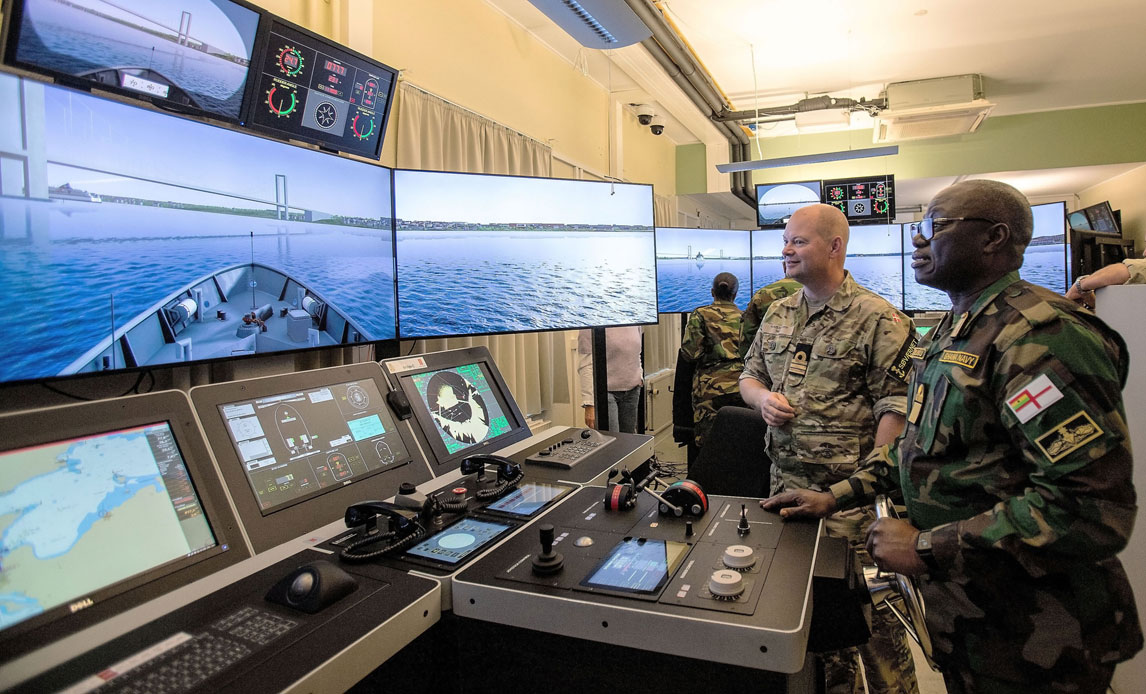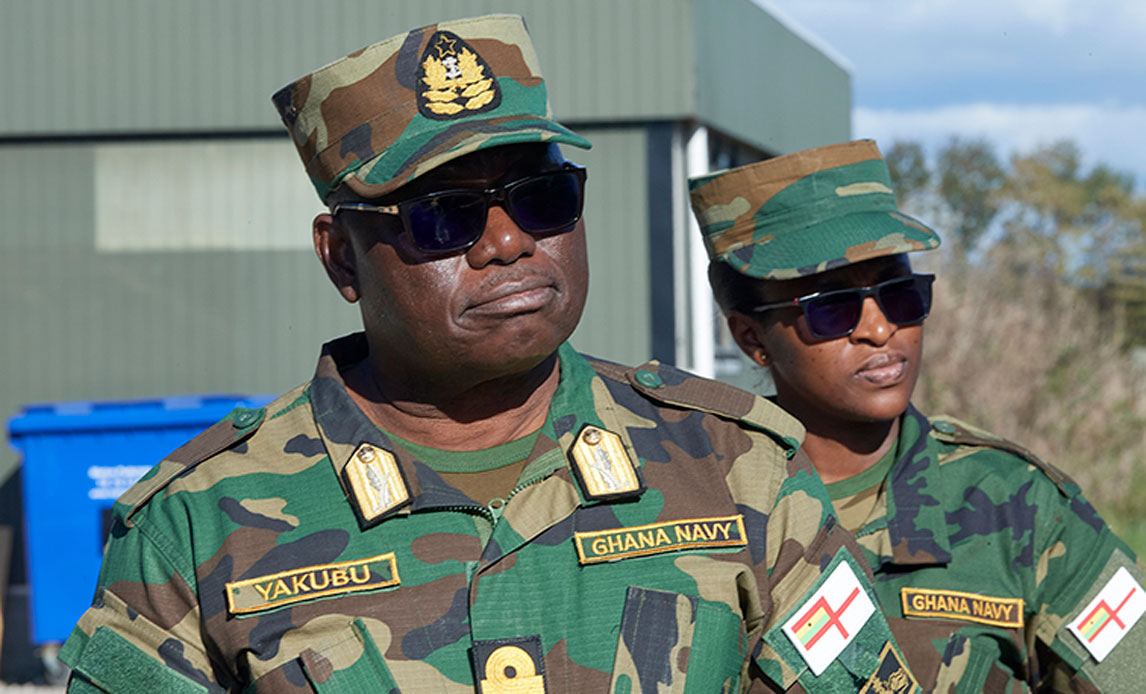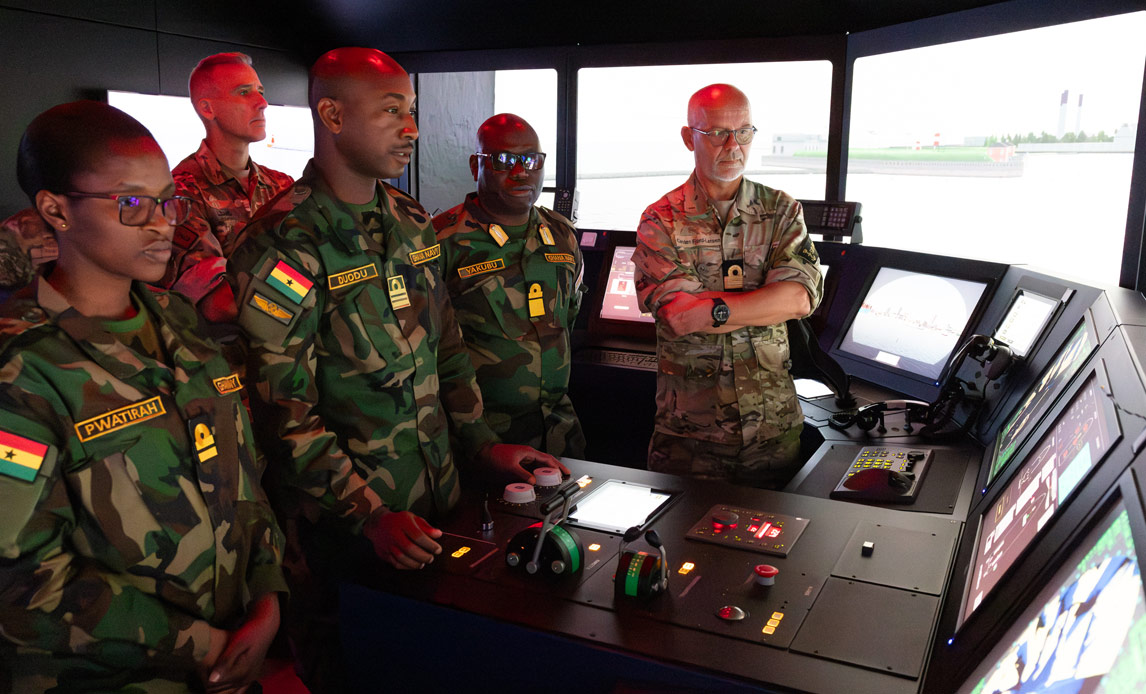The Ghanaian Navy Draws Inspiration from Denmark
Ghana is a crucial partner in Denmark's efforts to improve maritime security in the Gulf of Guinea. The head of the Ghanaian Navy found inspiration for his country's maritime security efforts during a visit to Denmark.

Rear Admiral Issah Adam Yakubu visited The Danish Homeguard Maritime Branch bridge simulator in Slipshavn. Photo: Torben Glyum / Danish Homeguard, Maritime Branch
By the Danish Defence Command
The Chief of the Ghanaian Navy, Rear Admiral Issah Adam Yakubu, has found inspiration for his West African nation's maritime security and anti-piracy efforts in the Gulf og Guinea during a visit to Denmark. The busy maritime region in West Africa plays a significant role for Danish and international shipping, and it has faced challenges with pirate attacks on commercial vessels. Consequently, Denmark, in cooperation with Ghana, works within the framework of the Peace and Stabilization Fund to enhance Ghana's ability to ensure maritime security in the area.
"We have an effort in the Gulf of Guinea to strengthen the coastal states' capacity to handle security themselves. This will benefit Danish maritime interests. Ghana has proven to be a partner with whom we can achieve a lot. We have very good relations, and especially during the deployment of the frigate Esbern Snare in the Gulf of Guinea from 2021 to 2022, Ghana proved to be a valuable partner, providing us with excellent support. We hope to build on this and contribute to the development of Ghana's navy while benefiting from the local perspective that Ghana can provide," says Rear Admiral Carsten Fjord-Larsen, Deputy Commander of the Naval Command.
Now, We Can Conduct Special Operations
The Danish program in Ghana began in 2019, and the Ghanaian authorities are experiencing the benefits of the collaboration.
"Ghana is one of the major players in the Gulf of Guinea, and I must say that cooperation with Denmark has already been of great significance. Before the collaboration with Denmark, Ghana did not have the ability to conduct boardings on ships that had been hijacked, where hostages were involved and there was a risk of resistance. With the standard that the Ghana Special Boat Squadron has achieved with Danish support, we can now conduct such special operations," explains Admiral Yakubu.

Admiral Yakubu visiting the Danish Jægerkorps - Army Special Forces - in Aalborg. Photo: Ann Outzen / Airforce Photo Service
Admiral Yakubu is also pleased that Ghana, with Danish support, is building a "ship in a box." This is a ship model constructed from containers, where special operations forces can train in boarding ships and similar disciplines without the need for real ships as targets.
Ghanaian Navy SEALs on the Horizon
A significant part of Denmark's engagement in Ghana is led by the Special Operations Command and the Frogman Corps, which contribute to the establishment of a Ghanaian maritime special forces unit. The effort includes selecting and training soldiers and establishing an educational framework so that Ghana can independently train maritime special operations forces in the future.
"The Special Operations Command has conducted several selection and training courses in Ghana. This has created the conditions for further education and specialization of soldiers into a genuine maritime special operations capacity. The cooperation with the Ghanaian defense is fruitful, and the soldiers are skilled and motivated," says Major General Michael Hyldgaard, the head of the Special Operations Command.
The first Ghanaian Frogmen from the Danish supportet program were appointed in September 2022, and a new batch in September this year. Danish Frogmen are gradually transitioning to a "train the trainer" role, with the goal of Ghanaians being able to run the program all by itself by 2026.
Ship Simulator Saves Money and Provides Better Training
During his visit to Denmark, the Ghanaian Navy Chief visited both the Naval Home Guard's bridge simulator in Slipshavn and the Naval Officers' School's bridge simulator on Nyholm. Ghana, as the first country in West Africa, aspires to build a simulator capability, and Denmark is making progress in potentially financing the simulator through the Peace and Stabilization Fund.
"A simulator can save us many expenses and risks. You can have ships and equipment, but without well-trained crews, you cannot accomplish your missions. A ship simulator will allow us to start training our officers without them having to sail, with significant costs such as fuel and the risk of damaging the ships. A ship simulator will save us time and money and increase our capacity," says Admiral Yakubu.

Admiral Yakubu visiting the bridge simulator at the Danish Navy Officers Akademy i Copenhagen. Photo: Anders V. Fridberg / Danish Armed Forces
"All the countries in the region face the same challenges of lacking the capacity to train naval officers, and Ghana hopes to develop a center with regional or even continental expertise. This has longer-term prospects, but it clearly aligns with our program, which has a regional focus, making it absolutely meaningful," explains Lieutenant Colonel Lasse Sand, Denmark's defense attaché in Ghana.
Collaboration across Africa
Denmark also supports an emerging collaboration between Ghana and Kenya. Kenya acquired with Danish support a bridge simulator in 2018, and the east African country can assist Ghana in getting started with the use of such a simulator. In return, Kenya is sending soldiers to Ghana this year to learn about planning maritime special operations, an area where Kenya lacks expertise.
Efficient Use of Resources
During his stay in Denmark, Admiral Yakubu visited both the Danish Army Special Operation Corps – Jægerkorpset - and the Frogman Corps, where he gained insight into the capabilities of these specially trained soldiers. The Danish soldiers' approach to solving tasks is a main take away for the Ghanaian admiral.
"More than anything else, what we take home is the mentality within the Danish Defense. The Danish Defense is small and has limited resources, but the soldiers are well trained and operate efficiently. Ghana is larger but has even fewer resources, so we need to have the same mentality to make the most of what we have," Admiral Yakubu emphasizes.
The Danish collaboration with Ghana is currently scheduled to run until 2026.
Facts
Denmark's collaboration with Ghana is carried out within the framework of the Peace and Stabilization Fund. The Danish Ministry of Defence's part of the program focuses particularly on capacity building and training for the military organizations of coastal states in planning and conducting maritime operations to address piracy and other maritime crimes in the Gulf of Guinea. From the Danish side, the Special Operations Command, the Naval Command, and the Danish Defence Academy are involved in the collaboration with Ghana.
The Peace and Stabilization Fund (FSF) is an inter-ministerial fund in which the Ministry of Foreign Affairs, the Ministry of Defence, and the Ministry of Justice participate. The fund was established in 2010 to enable Denmark to engage in the world's conflict areas.
Since its launch in 2010, the fund has supported peacebuilding and stabilization projects with over DKK 4 billion. The total allocation has increased from DKK 155 million in 2010 to approximately DKK 600 million in 2023.